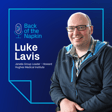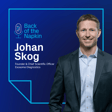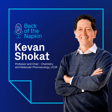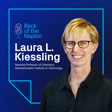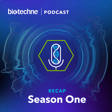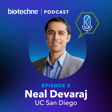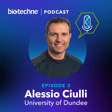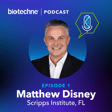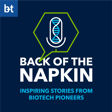Become a Creator today!Start creating today - Share your story with the world!
Start for free
00:00:00
00:00:01

Amy Ripka: Mitochondrial Dysfunction and New Ideas in Drug Discovery
Amy Ripka is the founder and CEO of Lucy Therapeutics. This back of the napkin conversation focuses on the importance of having the freedom to explore and generate new ideas. The approach that Amy advocates in this podcast has led her to pivotal new discoveries, including potential new therapeutics for Parkinson’s disease and Rett syndrome.
Lucy therapeutics: https://www.lucytherapeutics.com/
Paper - Playing Mozart to Chemical Reactions: https://jabde.com/2022/04/08/echocatalysis-playing-mozart-to-chemical-reactions/
Transcript
Unique Discovery Stories
00:00:03
Speaker
A discovery is said to be an accident meeting a prepared mind, but every story behind a discovery is different.
Untold Scientific Stories
00:00:11
Speaker
Perhaps the idea is conceived in a light-bulb moment, or a brainstorming session, or captured in scribblings on the back of a napkin. Here, we introduce you to scientific pioneers, taking you beyond their publication, and into Innovation Corner to hear the untold stories behind their discoveries.
Podcast Introduction
00:00:30
Speaker
This podcast is brought to you by Biotech, and I'm your host, Alex Maloney.
Amy Ripka's Musical Influence
00:00:40
Speaker
Today's guest is Amy Ripka, founder and CEO of Lucy Therapeutics and also one of the violinists that you can hear right now in the background. As well as being a CEO, Amy is also a professional musician and you'll hear in this episode this is something that's been invaluable to the success in her career in science.
00:01:01
Speaker
Recording this episode with Amy has certainly had an impact on me as a person. She's a proponent for a way of thinking that leads to the generation of new ideas.
Ideation and Failure
00:01:10
Speaker
And this is built around being unafraid to explore both unproductive as well as productive pathways.
00:01:17
Speaker
Amy's used unstructured learning to head in lots of different directions and to put the pieces together for a puzzle which forms a new idea. Ideation needs more time than we normally give ourselves and we should be encouraged to share these ideas, to pressure test them and to not be afraid if they fail.
Founding Lucy Therapeutics
00:01:37
Speaker
Amy gives some incredibly valuable insights into her story in founding Lucy and subsequently the values that she's instilled within the company.
00:01:47
Speaker
We talk about the thought processes that Amy used to identify nexus points which have shone a light on new mitochondrial targets for diseases including Parkinson's and Rett syndrome. And now with the support of her team at Lucy, she uses her skills as a scientist and a leader to work on developing new drugs for these diseases.
00:02:09
Speaker
I'm confident this is going to be an episode that motivates, inspires, and makes you feel empowered to go and make a difference in whatever it is you do.
Amy's Musical and Chemical Journey
00:02:18
Speaker
Welcome to Back of the Napkin. Amy, hello. Welcome to Back of the Napkin. Thanks for joining today. Hi, Alex. Really happy to be here.
00:02:33
Speaker
Great. Okay, Amy, I've been really excited for this podcast. You're someone who advocates for a way of thinking that I think embodies exactly what I wanted to capture with this podcast, with the name back of the napkin being about the moments that ideas are generated and created. So really excited for this discussion today. So, okay, before we get into it, then let's learn a little bit about you. So,
00:03:01
Speaker
Firstly, I think, you know, and what I should say is you're also a professional musician. So firstly, tell me about this. How did you get into music?
00:03:12
Speaker
That's a great story. So my parents are both chemists, so I was probably destined to be a chemist one way or the other. But my parents also played in a bluegrass band when I was a small child. They had a number of friends at DuPont where they both worked that played Dobro, Mandolin. My dad played banjo. My mom played bass.
00:03:32
Speaker
So from the time I was probably two, three years old, they would meet on the weekends a lot, almost every weekend to have jam sessions. And I would go and listen. I have vivid memories of this. And apparently when I was about five, I said, well, I want to play the fiddle because they had no fiddle player.
00:03:51
Speaker
And that really was the start of it. They found an elementary school teacher to teach me. They found a fiddle player to give me crazy lessons where, as a six-year-old, I would go to the University of Delaware and listen to him play. And then my mom would record on an old tape recorder the lesson. And then I would come home and have to
00:04:11
Speaker
try to recreate what he had been doing at the lesson. So it was great ear training. It was a very unusual way to learn. And that was really kind of the start of my music career. Chemistry came later, but I think from very young, I either wanted to be a musician or an astronaut, and the astronaut kind of also got the kibosh later. But yeah, no, it came very early, and it was definitely something that was driven by me. I think a lot of
00:04:35
Speaker
Musicians, it's almost a calling. Once you get exposed to it, you can't imagine not having it in your life. So that was certainly true for me. And did they let you in the band once you'd started playing? How long did you have to learn before you were a member? They probably made the mistake of letting me in the band pretty early. I remember they used to upend these. Any chemist out there will know this. Bottles of solvent used to come. You'd get these four by four four liters of solvent and they would come in a four pack.
00:05:05
Speaker
And my parents, I guess, were taking these when they were empty from the lab and they would upend them, turn them over, and then paste on each side the chord progression. And so I would listen to these and just play random notes. I could read the chord progression D, D, D, G minor, A, C major, and I eventually learned the notes to play and then played other notes. So it was complete ear training.
00:05:30
Speaker
This is a very different method of learning than Suzuki, which is something that's commonly children learn by. And I actually would be a big proponent of this. There are other methods. There's the Mark O'Connor method, which I think is a little bit more kind of like how I learned, which is really a lot of ear training. And it's not like there's a right way and a wrong way. I think it's a little bit more exploratory. So it was a great way to learn. So they let me in pretty early. And I can't say I was contributing to the good sound at the beginning. But eventually, I think I was contributing to it.
00:06:01
Speaker
Great. And this is still a huge part of your life today,
Chemistry and Music Parallels
00:06:05
Speaker
I gather. I see you've played with some of the kind of all-time music greats, people like Yo-Yo Ma, so tell me a bit about this. This is kind of the top end of music.
00:06:16
Speaker
I've been very fortunate. Since I moved to Boston, I got enmeshed through a friend of mine in the professional music scene, joined the musicians union, took some auditions, and a lot of it's word of mouth. Once people see you play, you get on certain contractors' lists, and these contractors make contracts for orchestras, ballets, operas,
00:06:36
Speaker
Even people, major stars that come like Sarah McLaughlin or Peter Gabriel, national tours for musicals like Les Mis, Phantom of the Opera. So I kind of got on these lists over the years. And yeah, I was fortunate to play with a lot of these folks. When I was very young, I played with Yo-Yo Ma, well, played with Yo-Yo Ma. He came and coached my string quartet. And I've been in orchestras that have played with him.
00:07:02
Speaker
And I actually have played with his sister in a kind of small chamber setting. So very fortunate to have been able to participate in this way with wonderful artists. I mean, music really is a calling. I mean, you can have amazing experiences even with non-famous people. I have been on stage with people where magical things have happened on stage. It's really
00:07:25
Speaker
It is, I guess, akin to some kind of scientific breakthrough ideas, but I find those are often, maybe there is an aha moment, but oftentimes I find they're kind of a staged event where you have an idea, and then you have another idea, and then maybe the first idea doesn't sound so good, and then eventually you kind of come to a almost anticlimactic aha moment where things have now snowballed and you are making progress. But yeah, music, I think there's a lot, I have another podcast where I've talked about this, I think there's a lot,
00:07:52
Speaker
that leaders can learn about leadership and also, even in the biotech world, using music and how people approach music as a way to approach leadership or even science. I think there are a lot of connections that one can explore there. That's really interesting. Let's get on to the science. Where did science come? I gather that chemistry was your calling. Where did chemistry come in?
00:08:18
Speaker
So again, both my parents were chemists. Both my parents worked at DuPont. It was almost a joke that I was just destined to be a chemist. I always did well at chemistry. I enjoyed chemistry. I really enjoyed the storytelling aspect. I mean, working at DuPont, my parents knew the stories of nylon and teflon and rayon. Some of these stories are quite interesting.
00:08:38
Speaker
They are not the, oh, I had a great idea and I followed it up logically and this led to some great product. Teflon in particular was a story that I think if people hadn't really
00:08:53
Speaker
been seeing what happened and really investigated this kind of mishap in the lab, we wouldn't have Teflon. And I think a lot of stories are like that. They sound great in reverse in hindsight, but the forward way is usually a little more chaotic than people want to admit. But I like chemistry. Chemistry
00:09:11
Speaker
Involved a lot of problem solving, which is something I really enjoy doing. You have to learn a lot of rules, especially in organic chemistry. I know a lot of folks in college think organic chemistry is just the bane of their existence, medical schools, students in particular. And there are a lot of rules. You have to learn how different functionality interacts with other functionality. You have to learn how solvents can affect a reaction.
00:09:37
Speaker
And while there are a lot of rules, just like in music, there are a lot of rules that need to be broken. You have to understand that you can't always use a certain type of solvent for a certain type of reaction. There's so many variables, concentration, heat, cooling, other
00:09:54
Speaker
phase transitions that you can use to your advantage. It's really fun and there are a lot of complications and aspects to it that I think make it a problem solver's dream. For me, I enjoyed the stories and how chemistry could contribute in the world. Chemistry processes are used for everything, for fracking, to production of gases, to plastics, to
00:10:25
Speaker
pesticides or environmental things that we use in the environment to clean up spills to drugs. So I think there's a lot of applications. And so at a very early age, I found that very appealing. And ended up, interestingly, when I went to college, getting a degree in music, but that was more of a process problem. And then also fulfilling requirements for a chemistry major and then going on to get my PhD in organic chemistry.
00:10:51
Speaker
So you're doing both at the same time here. You were able to juggle the two. Yeah, this is something I really want to get out to the podcast verse. I think there's a lot of pressure on kids and students to focus on one thing.
00:11:08
Speaker
this pressure that in order to be good at anything, you have to almost make that your exclusive focus. And this is, I think, a more recent development. Certainly in the Renaissance, this was not the case. And I think throughout history, this has kind of been in favor or gone out of favor. But I am a firm believer that having
00:11:26
Speaker
A singular focus can make you potentially blind to other ways of looking at a problem. And so I think music was something that for me when I was doing it, I couldn't think about chemistry. It was also a way of clearing my head. You can't be on stage performing and be distracted. You will give a terrible performance.
00:11:44
Speaker
And so I think it allowed my brain to rest and to not think about. It taught me how not to compartmentalize, I think that's the wrong word, but how to really focus on different things and not have that cross-contamination. But by doing that, when I went back to chemistry or come back to a problem, somehow my brain was refreshed and I was able to see it in a different way. Whereas if I just kept pounding on the problem, I found I could often get locked into a certain way of thinking about it.
00:12:12
Speaker
This may not be the same for everyone. I mean, music for me allows this kind of flexibility to really disengage and then reengage. But music also allows me to remember that you have to think about a lot of variables at the same time. When you're playing the violin, it's not just playing the right notes. It's what are you trying to communicate? What's your phrasing? What are the dynamics? Are you playing with other people? Did someone on stage just create a phrase or do something unexpected that you want to amplify?
00:12:41
Speaker
And again, one can think about this in the biotech world, too. I think when you're thinking of where do new ideas come from, they often don't come in a straight line. Like, I'm working in this field and then I did this and then I did this. You may have gone to some, I don't know, random lecture, someone talking about physics or someone talking about trophic cascades in ecology. This actually happened to me. Trophic cascades have a lot in common with drug discovery.
00:13:07
Speaker
It turns out the idea of a trophic cascade in ecology is that you have predator or prey, and when you remove one of those from the system, you have this kind of cascading events in the different levels of the ecological system. Well, it's kind of the same as a drug, right? You want to intervene in a very particular way in a complex system, and how is that effect going to cascade down or up?
00:13:30
Speaker
I think that's a really nice analogy. I just want to take it back a second there, Amy. It sounds like you really found a perfect balance between music and chemistry of which both complimented each other.
00:13:42
Speaker
you know, perfectly paved your kind of career through to do both. And I think that's a really important point to make, actually, that you can do both. And it's the way that you use both to complement the other that seems invaluable here. We'll come on to Lucy and Lucy Therapeutics in a second. But talk me through some of the key moments
Drug Discovery Career
00:14:00
Speaker
then. So you've had a long career of around 20 years in drug discovery, which has been across biotech, pharma, CROs.
00:14:10
Speaker
Talk me through some of the key moments in here. I see looking you up that you've got 30 issue patents, six INDs to your name. I'd be really keen to hear about how some of these happen and what you learned along the way. Yeah. I mean, it's definitely been a journey. I think when I started at Bristol Myers Squibb out of my postdoc, I thought,
00:14:34
Speaker
I would probably stay there for the rest of my career. I think many people at the time going to big pharma during the late 90s, even in the mid 90s, was just what one did if one went into industry. There were some biotechs, but not nearly what we have today. So it was a very common path, I think.
00:14:54
Speaker
At the time, pharma would come to many of the universities we were all at and interview us and fly you out. This is very different now, but at the time, this is what happened. I had a number of interviews. They would fly us around the country.
00:15:09
Speaker
I liked Bristol-Meyers Squibb mainly because they had a very open attitude towards the types of people they wanted at the company. At the time, Certain Pharma really did favor certain labs at certain universities. BMS, I think, was unusual at the time.
00:15:27
Speaker
of really being open to a wide range of folks, maybe not all at the top tier universities, of course some were, but I think really trying to get different perspectives into the company. And that really resonated with me. So I joined Bristol-Maris Squibb, worked in the Wallingford site in Connecticut, really enjoyed my time there. I worked a lot in the antiviral group on hepatitis C as well as HIV, a lot of great science.
00:15:56
Speaker
I think one of the best things about going to Big Pharma early in my career was there were a lot of people with a lot of experience, and you could wander the floors and talk to them. Formulations, process, people who had put drugs in the market, people who had worked in different indications. Our animal pharmacology group, the analytical chemists.
00:16:14
Speaker
And it was great training. A lot of people, I think, in the industry will say this too, but working at Big Pharma early in my career certainly set me off to understand a lot about how things could be done and at least in many ways should be done to end up with successful drug candidates making it into the clinic. There were a lot of experts, a lot of people had done this before, so there was a track record. So it was really great to learn that. I then... Oh, sorry.
00:16:43
Speaker
I was just saying it sounds like a really great place to start to kind of get that understanding of the applications and what you can do. So yeah, please carry on, Amy.
00:16:53
Speaker
So then I moved up and worked in a variety of biotechs up in the Boston area. I got kind of poached to work at Infiniti. I then went from Infiniti. I worked at Diomed. And biotech's a little bit more chaotic. So sometimes you'll start out in a research program, and then the company will pivot to doing mostly clinical development. And sometimes then they're doing less research. So I definitely think at the time, people were moving around a lot.
00:17:19
Speaker
trying to be at a company where their skills could be most utilized. So, from infinity to Diomed. And then I was very interested in maybe taking a broader view. So, I did something that at the time everyone said was a bad idea, which is kind of step back. At the time, Diomed had actually been sold and they
00:17:41
Speaker
The company who was the parent company to Diamed decided to shut down US operations. So that was kind of precipitous. And looking to find something to do, I thought I could go to another biotech or maybe I could consult. And everyone said, oh, terrible idea. You're too young in your career to consult. But it was really great. I ended up consulting for hydro biosciences, FoldRx, Envivo Pharmaceuticals at the time, which later became Forum.
00:18:05
Speaker
And it was a great way to kind of suss out, hey, is this the group I gel with? Is this the place and position that I might be interested in? And that exposure also to different therapeutic areas, different technologies, was incredibly useful. At the time, too, that was really when CROs were getting popularized for both pharma and biotech. And so working with them, getting to know who they were,
00:18:29
Speaker
actually turned out to be a huge advantage as I continued in my career. So worked on ion channels, worked on transterritron, worked on a whole bunch of diabetic targets at Diomed as well. So really kind of
00:18:48
Speaker
expanding beyond antiviral. At In vivo, they were doing a lot of central nervous system work where I got to work on gamma secretase modulators and a number of other targets. So really broadened, I think, my perspective. And again, some of these drugs went into the clinic. So seeing how INDs worked, getting to be involved in that process.
00:19:08
Speaker
And then my career kind of took another turn where I decided to join a contract research organization.
Cultural Insights in Science
00:19:14
Speaker
And again, everyone said, really? You want to do this? Why don't you just go to another biotech?
00:19:20
Speaker
And at the time, it was someone I really wanted to work for. And I thought the exposure to a different part of the industry and also an exposure to some of the more business project end of the industry could be interesting. And it turned out to be the best competitive intelligence training I could have gotten. I really saw what a lot of folks were doing, realized what was getting funded, what wasn't. And at that point, really started to kind of germinate this idea that
00:19:46
Speaker
I had looked at mitochondria at many of the other companies I had been at. It had become an interest of mine on the side. And at different times, I would look at how the targets we were working on might be involved in mitochondrial function or dysfunction. But nothing had really crystallized.
00:20:03
Speaker
But as I worked at the CRO and thought more about this and was aware of what other companies and other academics were doing, it became more and more interesting to me that maybe mitochondria was driving a lot more of the processes than we thought. And they were actually the real key downstream instruments for what was maybe an upstream activation of an enzyme or receptor.
00:20:27
Speaker
And so while I was at the CRO, I was kind of germinating these ideas. And again, frankly, it was also really helpful to understand how the CROs function on the inside. I think one thing, and this may be something I'm not sure everyone really appreciates. People will give lip service to it.
00:20:50
Speaker
Many of the CROs we work with are in countries that have very different cultures than the Western mindset. And I think there's often a lack of appreciation and understanding of these cultures. And I think that's essential. If you're going to be a Western business, doing business in a global sense, you can't just impose the Western viewpoint on your colleagues and collaborators. It's not going to work.
00:21:18
Speaker
I will tell you, I still think that is the predominant mindset. I think we have not done a good job of really understanding how do we work effectively with different cultures to get the most out of them, to help them get the most out of us and have it to not be
00:21:37
Speaker
I don't want to say adversarial, but I would just say less cooperative than it might be. And I would put it out there again to the podcast first. This is something I really wish people would take more seriously. I mean, I'll just, again, say something controversial because I love saying controversial
Human Interaction in Research
00:21:52
Speaker
things. We like that, yeah.
00:21:54
Speaker
A lot of VCs will tell you, you don't need HR. There's a lot of pressure in the venture capital world to have human resources come in very late. I've had one VC tell me, you shouldn't have HR till you're 100 people.
00:22:08
Speaker
But I will put it back to what I just said, which is this is basically saying that we are not prioritizing how we interact with other human beings. And the sad truth is everything we do, even the science, is predicated mostly on human beings. Yes, it's predicated on the data, but the human beings control the strings of, you know,
00:22:28
Speaker
who's generating the data and who's getting funding for the data. So you have to, this is an equally if not more important part than just the science. I know as scientists we like to think it's just about the science, it's just about the data, but it's not. And I think the sooner we realize that the better. I think there's been a long history of not prioritizing
00:22:49
Speaker
how we work with people and how we get the most out of people. And I think this is where, just to go back to my music days, music can be informative. You know, if you are, and I've said this on another podcast, the last chair in the violin section, ostensibly the least important violin in the section, and you are playing wrong notes in a performance, it doesn't matter that everybody else is playing
00:23:12
Speaker
all the right notes in the right way, the audience is going to hear that something doesn't sound right. And I really think if organizations could be more like that, realizing the least of us really is as important, you know, quote unquote, as the most of us. Again, I think that's given lip service, but not always really embraced in the way that in other disciplines like music, it has to be embraced for success.
00:23:37
Speaker
Yeah, some really interesting points there, Amy, a lot to unpack. And it sounds like in your kind of journey through your professional career, you've learned a lot more than just kind of science about how organization works and what it takes to make organizations work. So I think that's some really valuable insights there.
Focusing on Mitochondria
00:23:53
Speaker
So let's get on then to Lucy Therapeutics, where you founded and are now CEO. So tell me about Lucy. Who are Lucy Therapeutics?
00:24:06
Speaker
So initially the name, so we'll start with the name, comes from the hominid found in Ethiopia in the early 1970s, Lucy Australopithecus. And the reason I named the company Lucy was because we were focused on mitochondria and addressing mitochondrial dysfunction and disease. And all your mitochondrial DNA is inherited from your mother. And the oldest mother is Lucy.
00:24:32
Speaker
So I thought it was a fitting name for the company. I really like it when companies personally have names that are meaningful and associated with what the company's doing. So I also thought it was an unusual name, which I liked as well. So that was the genesis of the name. But the company genesis was pretty abrupt. I left the CRO I was working at and spent about a year and a half reading about 3,000 papers on mitochondrial biology.
00:25:00
Speaker
Not necessarily thinking about starting a company, but just taking the time to pursue a passion that I hadn't really had time to pursue when I was working full-time. I was really fortunate to be able to do this. Then as I kept reading and reading, I realized most ideas don't come as an aha moment. I think we love to tell those stories, but they come from
00:25:24
Speaker
kind of a long windy path of going down unproductive pathways. And then maybe going down a productive pathway and then having a conversation and realizing, nope, that's actually unproductive. And then getting another idea and then suddenly finding an idea that you keep pressure testing and you can't find a hole in it. And so it's very unsexy. And I think when companies say, well, you should spend 10% or 20% of your time thinking of new ideas, I hate to say it, but I'm not sure that's enough time. You really need time to
00:25:52
Speaker
It's almost like you need to hire people and their only job is to sit around and just proffer up all these ideas that can be pressure tested, either with experiments in the lab. And this used to happen. Bell Labs, Xerox, there were companies that did this. And I think we're in an environment now where we're so metric driven that this is not really seen as an option.
00:26:13
Speaker
But I mean, I think I'm a prime example. Lucy therapeutics wouldn't exist if I didn't spend this time not just reading papers on mitochondrial biology, but learning how to read not just CNS papers or cardiovascular papers, but skeletal muscular papers, understanding more how the kidney works because mitochondria is important in the kidney. And what I realized was maybe one of the reasons people haven't focused on mitochondria is a lot of the literature is in widely different disciplines that nobody synthesized.
00:26:43
Speaker
And all the AI and machine learning in the world won't synthesize that together. I think we often forget AI has the potential, certainly, to do what's called unsupervised learning, where it's actually finding new paths without training sets.
00:26:59
Speaker
But still, a lot of AI is predicated on training sets. So if you don't have a positive training set for what you're looking for, we have very few drugs that work for Parkinson's. So there's very limited training set. If you want to say, here's the training set for drugs that work for Parkinson's versus the set that says, these are drugs that don't work for Parkinson's. And I think it's the same when you're trying to come up with new ideas. If you're trying to come up with something that's never been done,
00:27:27
Speaker
There's really no substitute, I think, for the human brain and this kind of hard work. It doesn't mean that you will always be successful and find the right path, but I think it will give you the best chance. Again, sounds horribly unsexy. I think we love these origin stories that sound like, oh, I was just sitting and an apple fell in my head. And I think what I'd like to get out there is that
00:27:53
Speaker
you might have an unsexy idea already brewing in your head. And it might be more special than you think. And I would encourage people to take the time to kind of pressure test it and explore it. And ideas need to be rolled around with lots of people. They shouldn't just roll around in your own head. I think that's something that was important in the founding of Lucy. I talked to a lot of people. I was a scientist by training. I'd had some BD exposure and VC exposure when I worked at the CROs.
00:28:22
Speaker
But there was a lot I didn't know. And again, I think it's another thing we were always afraid to say, oh, I didn't know something. But the only way to know something is to first acknowledge that you may not know it and to learn it and to ask someone. So I did a lot of networking. I asked a lot of.
00:28:39
Speaker
Basic questions of people who i trusted and now i have all that knowledge so again i would encourage people don't think i can't do this i don't know how to do this you would be surprised what you can do if you put your mind to it and are kind of put on that.
00:28:55
Speaker
almost youthful childlike mentality of being unafraid to not know things. As a child, we all get out there and fail all the time constantly. No child ever does something perfectly the first time. But as adults, we don't give ourselves permission to do that. And I think that's a big mistake and is preventing a lot of great ideas from getting out into the world.
00:29:18
Speaker
A really important point, Amy. I think it's getting into this section of the podcast that I find most valuable, which is like this back of the napkin moments and how you sit there and think. It sounds like, and it's maybe something that I haven't been wise to, is there's a way you need to allow yourself to think and not be afraid of failure.
Exploring CNS Diseases
00:29:39
Speaker
So, let's go into this back of the napkin section. This is where I want you to take me into the innovation corner. How you think about things and how you come up with these ideas. You've already spoke about piecing lots of bits of the puzzle together and taking a look back at what the innovation should be and what the
00:30:01
Speaker
problem is that that innovation can solve. But talk to me a bit about how you've used this at Lucy, specifically to work on the disease programs that you're focused on. Well, it definitely wasn't a straight path. I think the way this initially happened was I had an interest in CNS. I've always had an interest in CNS. I think many CNS diseases are very poorly served.
00:30:30
Speaker
I think the industry is focused on niche genetic populations and the assumption that if you can treat them, that will translate to these wider diseases has not frankly really borne out too well.
00:30:46
Speaker
I thought there's gotta be a different approach. I mean, we have drugs for complex diseases outside of the CNS. So heart attacks, right? Many reasons why people get heart attacks, but statins have proven to be very effective in treating and preventing heart attacks. Again, through the cholesterol pathway. Checkpoint inhibitors. Again, not found, particularly by genetic means, but their mechanism is really on point as we're discovering for a wide range of cancers.
00:31:14
Speaker
So I think there are examples out there and I really wanted to find that for CNS. So initially it was frankly very unstructured. I didn't know a lot about mitochondria at the beginning. I did a lot of reading how mitochondria work. What was, how did they evolve? Right. Even such simple questions that I would put it to you. I wonder how many people can answer today. Like why did the mitochondria give up the specific DNA it gave up to the nucleus?
00:31:39
Speaker
How did that all sort out? How did the nucleus end up with the DNA it has and mitochondria kept the genes that it kept? Not such an easy question. Why are mitochondria uniparentially inherited from your mother? I mean, they could potentially be from your father, but why not? Why the mother? Why not from both parents? I mean, there's a lot out there where people talk about this.
Research Methods and Targets
00:32:02
Speaker
And I think I went down a lot of rabbit holes just simply trying to understand, thinking that this overview of the mitochondria may help me understand some of the more specific drug discovery problems, but there was no guarantee of that, right? So this was what I call unstructured learning, like just getting out there.
00:32:19
Speaker
And then I started to look at, well, what are targets that people have looked at at the mitochondria? I mean, there's a whole bunch. What have been the approaches? Why have they not worked? So even at this point, I didn't have a target. It was still very amorphous. And I also had to learn a lot about cardiovascular biology, nephrology, skeletal muscular diseases, all of which these organs are particularly reliant on mitochondria.
00:32:47
Speaker
It became initially, I would say this was the kind of big bang part of the program where things were just expanding. I wasn't contracting in on any ideas. Part of the back of the napkin, I did buy these enormous Post-its from Staples because trying to keep all this knowledge in my head or even on
00:33:05
Speaker
a computer was getting very unwieldy. And my partner would say, well, you should just use different screens. Just get more screen. And I was like, no. So I bought these posters, and I put them up in my living room. And I would write a central theme in the middle, like Rett syndrome or a certain type of cell or maybe a target or a process. And then I would draw arrows and write the reference and then the idea. And then that might go to another reference and another idea. And sometimes then that reference would spawn other things.
00:33:35
Speaker
And sometimes it just looked like a big spider web. But after looking at it long enough, sometimes I started to zero in on, huh, this seems to be a key process in multiple Post-its. And that's kind of what ended up happening. Again, it was not a linear process.
00:33:51
Speaker
I know we love linear processes, but this was not linear. And this really ended, it got me thinking particularly initially about targets. So there was a GPCR, which we still haven't disclosed, that I became very interested in for a variety of neurodegenerative diseases and neurological processes, and then a FATPA, which turned out to be our target we're working on for Parkinson's. But I looked at it initially for many other diseases. So I kind of,
00:34:16
Speaker
came to a target that seemed to be central in a number of processes and then spent a lot of time thinking about which disease is it most central in, right? Or is this a less specific process or a more specific process? And so several targets fell out because it wasn't really clear how you could necessarily
00:34:37
Speaker
point them towards one disease. Maybe it's more broadly applicable, but it's also harder to drug. This was an idea of coming back to your mind map and saying, okay, I like this target. Now, what could I pull out based on all these targets that we can now work on?
00:34:55
Speaker
Yeah and many targets just fell to the wayside like I would dig further and further into them or look at diseases and be like oh like this is either too complicated or I can't really pin it down to a process or I can't pin it down to kind of a nexus point like I kept looking for
00:35:12
Speaker
targets that would be kind of like statins are for heart attacks. They can connect environmental and genetic factors. They're clearly, let's say, a gateway point in the disease where if you can intervene at that point, you're kind of at a magical point. You're not too early or not too late, but yet you're at the confluence of many genetic and environmental factors. That's also very difficult information to dig out. I will tell you,
00:35:37
Speaker
just doing keyword searches will not find this information. And that's why reading all these papers was so important because sometimes in the middle of a paper, something that was not indexed anywhere, I would find one sentence that would send me off on a whole different path. So again, not linear, but I think how what was key was realizing
00:36:01
Speaker
There was a lot of information hidden in different places. And then the second thing was how do I put all this in one place where I can digest it? And then the third was how do I pressure test this, right? Like a lot of things just turned out to be bad ideas or at least non-progressible ideas. And like with FATPAs and this GPCR target, I kept talking to people and reading more. And it just seemed like there were not a lot of
00:36:26
Speaker
barriers, like these really seem to have traction. And so those were the two we chose to go forward with and Rett syndrome and Parkinson's kind of emerged for many different considerations, scientific business, you know, appeal to pharma. I mean, you can't just look at these, I think a lot of times we're like, the science is going to drive everything. And I don't, I think if you can overlay other concerns, you know, just the tractability, the feasibility of the clinical trial,
00:36:51
Speaker
What's the appetite for VCs or investors for what you're doing? I think you will make your life easier because you're going to have to deal with that eventually. So if you can deal with it at the beginning, it's helpful.
00:37:05
Speaker
So the FATPAs then. So I need to be careful how I structure this question. So me and others enjoy the occasional glass of wine. And hear me out here. The molecular biologist in me would look a little deeper into the glass and note that resveratrol is one component of red wine that's kind of abundant as this natural product polyphenol. And I saw that
00:37:33
Speaker
So this resveratrol is attributed to having health benefits and things, and I was actually looking out of curiosity. I saw that this does also bind to the FATPA. So I wondered, and this is, of course, just speculating, do you think there's any kind of reason, could that be that when we're drinking red wine, we're actually helping our mitochondrial health and that might be what we can feel less guilty then?
00:38:02
Speaker
One of the things that's always important is to embrace complexity. So many molecules like you just mentioned and even turmeric and others, I think do many things and it's really not clear what they're all doing. I think it becomes attractive to
00:38:20
Speaker
pick out the one maybe positive aspect that we think they might have. And I think for drug discovery, this is very, I think this has actually set back a lot of mitochondrial work is that people have looked at a lot of oxidants, antioxidants, and chemically, me being a chemist, I think these compounds can do a lot of things. They can be toxic, they can make radicals, they can bind to proteins, and they can also probably do positive things. But I think the key is trying to
00:38:50
Speaker
interact with targets in a way with chemical matter that we feel is as specific as possible. Now, not everything, every drug you take has multiple targets, no matter what anyone tells you. It's never just interacting with the target that it's approved for. But I think we have to be careful. I mean, exercise, right? I mean, if you wanna look at one of the things that is most correlated with helping neurodegenerative diseases, exercise is at one of the top of the list. I mean, coffee is up there with, you know, in some studies as well.
00:39:20
Speaker
But I think what we're trying to do at Lucy is say, OK, even the mechanisms that we're looking at, can we take, as you've pointed out, any kind of coincident knowledge, environmental factors, health factors, and genetic data or epigenetic data, and do they all point
00:39:42
Speaker
at the same nexus points. I think that's what we're trying to do is find where the data is consistent. Like, for example, if we thought exercise would be bad for FATPAs, then it would probably, since we know that that is good for Parkinson's, that might make this target look less appealing.
00:39:59
Speaker
So I think we take that data into consideration, but I think the industry, for better or for worse, is really focused on genetic validation.
CEO Reflections and Leadership
00:40:07
Speaker
And I think what we're trying to do is get the industry to think more that genetics are important, but risk factor does not mean biological intervention point. I mean, that's been shown, again, statins and checkpoint inhibitors are great examples of that. And I think it's also important to remember that this is complex. No matter how much we think we're interacting with a target in a specific way, there may be unintended
00:40:29
Speaker
effects. Statins, again, just to go back to that, I think there have been some reports out of Johns Hopkins that statins actually have an effect that seems to be beyond their cholesterol-lowering activity, and no one has really dissected that. This is the tricky part. Everyone wants to think
00:40:49
Speaker
I interfere with this target. There's an immediate downstream effect. Maybe there's protein regulation or phosphorylation or some second messenger effect. And then it leads to the desired effect in disease. And it's never that simple. No matter how much someone tells you that kind of story, that's not what's going on. So I think our point is if you can find these nexus points, no matter how you get there, you're more likely to affect a wide range of patients in a meaningful way for that disease.
00:41:17
Speaker
Yeah, that's a good point, Amy. Is there a similar story as well around retinoids and how they became used for the treatment of acne as well? I think it's a similar scenario.
00:41:34
Speaker
Let's spend a bit of time talking about you being a CEO. How have you found this and how has being a CEO differed? What have you learned along the way? What would you tell Amy on day one if you could go back now? I would say to Amy on day one, you should have five or six other CEOs on speed dial.
00:42:03
Speaker
It's something that I think I didn't have the respect for the job that I do now. The buck stops with you. Ultimately, all the bad stuff, you have to take ownership or you should take ownership of. Not all CEOs do this, but I think that's important. I think you should give credit for the good stuff to your team.
00:42:26
Speaker
You have to realize as a CEO, there are a lot of competing streams that not everyone is going to be aware of the organization. You have financial streams and financial pressures. You have financing and deals that you need to make. You have business decisions of how you're going to structure those to move the company forward in the way you want.
00:42:47
Speaker
organizational challenges. You have to figure out what kind of culture you want to build, and if people fit into that culture or don't fit into that culture, what are you going to do? How are you going to handle that? Are you going to build a culture that's very much in the model of how things have always been done, or are you going to try something new? Which may mean you might get pushback from different people, people in your organization, people outside your organization.
00:43:12
Speaker
I think it's very challenging. Again, music informs this. When you're performing, you have to keep in your head equally many widely different inputs simultaneously, whether it's how you hold your instrument, all the things I mentioned before. Dynamics, who else is on stage? What's the conductor doing? Is your mic working?
00:43:34
Speaker
Being a CEO is very much the same. There are different pressures on your time. You have to keep all the balls in the air. One orchestra manager once told me, if only 20% of the musicians are complaining at any given time, you're probably doing a good job. With CEO, it's probably similar.
00:43:56
Speaker
I think you just, the biggest thing though, is you just have to keep going, right? You're never gonna be doing everything to please, it's gonna be pleasing everybody. You have to have some vision of what you think is the best way to move forward on all these different fronts. You have to be very open to other people's thoughts and ideas, but maybe not always too open. Sometimes, you know, at Lucy, we started a unique bonus program, which I've talked about.
00:44:22
Speaker
And there was a lot of pushback from pretty much every aspect, you know, internally, externally. How did it work?
00:44:31
Speaker
So the bonus program is in the simplest sense predicated on the idea of trying to reward people in the company equally based on company goals. So usually bonuses are a percentage of your salary. So the people that have larger salaries also have a larger percentage bonus, which actually compounds the income inequality problem. And I think it can be disincentivizing to younger folks who maybe are making seminal contributions to the company, but they're not seen
00:44:59
Speaker
at least monetarily, as valuable. So I made the radical suggestion that maybe to address income inequality and employee retention and have us all really focused as a team, instead of having a percentage of each person's salary, we put all of that money in a single pool and divide it equally. So the idea is we get the same dollar amount. So if it's $20,000 or $30,000, I get $30,000 and the research associate gets $30,000 based on how many
00:45:29
Speaker
company goals we've achieved, board approval, et cetera. But it's a more equitable way. It's putting my money where my mouth is to say, yes, we're all important. And this is a very radical idea. I mean, some companies have done this. I don't know if we're going to be able to do this forever as you scale, you have new problems. But my attitude is if you start at this end, the end kind of more equality rather than starting at the end of more inequality,
00:45:55
Speaker
Even as we get bigger, we still should be in a better place, right? Because you start to have to make steps from that. But we're not going to end up, I think, where maybe the industry has historically been, which is, I think, much more heavily weighted towards executives. You can imagine this brings up a lot of questions. How do you retain people, especially more senior people? My attitude is, at some point,
00:46:19
Speaker
In order to change things, you just have to change them. I have put it on my head. I am ultimately responsible if this fails or succeeds. We'll just see how it plays out. So far, I think it's brought a lot of good to the company. It's brought a real sense of camaraderie and a real sense of value that
00:46:42
Speaker
I think is really important. I mean, being CEO is important. There are a lot of things I do that other people don't do, but there are other things that people in my organization do that I can't do. And if they weren't there, the organization would equally be failing. And I think that's what we're trying to convey. I think that's really admirable, Amy. I think that's really inspiring, actually. It's interesting to kind of get your perceptions on how it's working and this idea of just having to make the change to see what happens as well.
00:47:12
Speaker
Let's get on to another section, which is leaders. You've already touched on this, about having CEOs on speed dial. Through your career, who has been inspiring to you? Who have you looked up to as you've gone through the processes? It's definitely been different people at different times. I think
00:47:37
Speaker
Early in my career, there were definitely moments where I was pretty headstrong and I had some folks pull me aside and say, hey, you may not want to fight every battle every time one comes up. And then as I
00:47:53
Speaker
went further in my career, sometimes there were just very difficult challenges. I mean, there are some very difficult people in biotech, I will say this, and I think, you know, not all biotechs are run the same way. And so I have been in some very challenging personal dynamic situations that have been very, very difficult to navigate. So I definitely had, you know, I'd say a whole
00:48:15
Speaker
other cohort of folks who maybe had been in similar situations. Someone I believe that has been or will be on your podcast, Jennifer Petter. She's been a previous guest, strongly recommended you actually. She was a great mentor, especially when I was starting Lucy, and I've said this before, but
00:48:34
Speaker
She was one of the few people that would call me and say, hey, Amy, let's get together. I think we often put it on others to call us, you know, and sometimes that doesn't happen. And how often are we the ones reaching out? And a lot of people don't reach out for many reasons. But I have to say, I really appreciated
00:48:54
Speaker
Jen reaching out because sometimes you're just in a dark place, especially when you're starting a company or things aren't going well. And to have someone else kind of kick you out of that and say, okay, we're having lunch and what's going on? What's not working? What's working? How can I help you? It was invaluable. And I would encourage everyone out there in a position of leadership
00:49:17
Speaker
to make time for other people. It doesn't have to be everybody. But I think if everybody made time for even one other person in the industry like Jen made time for me, I think it would have a huge ripple effect. I think a lot of times
00:49:34
Speaker
For better or for worse, I think deep, deep down inside, maybe people want to do things that are in service of themselves and their own career. And I think sometimes that doesn't even raise to the conscious level. I don't think anybody does this consciously, but I do think there's oftentimes an unconscious drive to be successful.
00:49:56
Speaker
I think we also need to remember sometimes, again, what might seem like, I don't want to say wasted time, but what might seem like time that is really tangential to maybe what, quote unquote, we feel we should be focusing on can be just as valuable. I've had lunches where
00:50:13
Speaker
I feel like, oh my god, I don't have time for this. I really can't do this. And I go to the lunch, and either the person is so inspiring or we get off on a topic that's of interest to both of us, or I learn something that no idea this was going to happen that's directly relevant to what I'm doing, or the person is just amazing and I have no way to really interact with them in my current work situation, but I want to keep in touch with them. I think one has to be very open to this, these kinds of random
00:50:42
Speaker
uh interactions and again to make the time to have those happen not everything has to be metric driven and I think making time for someone else to mentor them can be more beneficial uh to you than you think uh I think um again I I don't know why we we live in a world where that seems to be um so different but again I think it might
00:51:09
Speaker
might come down to culture. Western culture is very individualistic, right? Other cultures are less individualistic and more about the collective. I mean, even something as simple as that, I think just to keep that in the back of your mind and realizing like we're a product of this culture, maybe that can be instructive about how I, you know, want to be the change that I want to see in the world is starting with myself.
Catalyst for Change
00:51:32
Speaker
What motivates you, Amy?
00:51:37
Speaker
That's an interesting question. I think I'm motivated by, I definitely am motivated by trying to be, as I've said to some people, the tip of the spear.
00:51:51
Speaker
the ability to maybe take some lumps to try new things that other people may not be in such a privileged position and I'm willing to take those lumps. So I think one of the things that motivates me is to get out there and say and do some of the things that I feel a lot of people are thinking but nobody either feels they can say because of their position or wants to say because they're worried and they may have very real reasons for these worries, you know, how it's gonna affect them.
00:52:19
Speaker
I just don't care. I just feel like I think there's a lot that we do out of fear. One of my favorite movies is Strictly Ballroom, and I don't know the Spanish, but at one point in the movie, one of the protagonists says, a life lived in fear is a life half lived.
00:52:36
Speaker
And I think that's really true. And I'm hoping to be a beacon for people to say, don't live your life in fear. I mean, again, for some people, I mean, there's some very real consequences. You have a family. You can't lose your job. You have responsibilities that are going to be massively impacted by you maybe putting your neck out. So my hope is and what motivates me is that I can get out there and maybe say and do those things because of my life situation in a way that other people can't.
00:53:05
Speaker
but hopefully it will improve their lives if we can get some of these changes to occur. I also am motivated by trying to help people, and I don't mean that in a Pollyanna way. I think even with the bonus program and other things we're doing at Lucy, really trying to
00:53:25
Speaker
Expand the biotech model, you know show people you don't have to be necessarily an academic or a big pharma executive to start a company You know, you don't necessarily have to be out of your postdoc to start a company, you know There are many many different company formation stories and the more we can get out there the better I think getting out on these podcasts and just You know, I I really wish more people would Try and
00:53:54
Speaker
promote the change they want to see in the world even with the fear that you might have because what I have found is a lot of people feel the same way in private and it's really again I'm not saying the fear is not justified it's many cases more than justified but it's just so sad and so it I am hugely motivated by that because I think that will only bring
00:54:17
Speaker
I'm hoping, more positive ideas and effects into the world. Again, kind of like the Me Too movement. Once one person steps out, and then another person steps out, and then another person steps out, and then some of these things that maybe are systemic in our industry that aren't really working for anyone can be addressed in a better way. That's a great answer.
00:54:41
Speaker
I was really keen to ask you that question because as we spoke, your answers to things and the way I see that you're wanting to make a change, it's so inspiring. I really thank you for telling that on this podcast. It's exactly what I want the messaging to be, so thank you.
00:55:01
Speaker
So we are running out of time, Amy, but there is a feature we do on this podcast, which is something fun
Humor in Science
00:55:09
Speaker
to finish. And I wanted to come up with a game that was kind of engaging and encompassed a lot of the things that we'd talk about. So music, chemistry, coming up with ideas. And I found a publication in a journal. It's actually a satiric journal called Journal of Immaterial Sciences.
00:55:28
Speaker
and they published a paper in here, which is completely nonsense, but it's called eco-catalysis, playing Mozart to chemical reactions. The premise of this paper is that they use some innovative thinking to come up with an idea that was if you play certain songs to chemical reactions, you would get higher yields.
00:55:52
Speaker
I'll drop a link to the paper in the show notes for this so people can read it. But the way that they've kind of come up with this story is very clever. So what I wanted this game to be, one of the things that they do is they look at doing a
00:56:08
Speaker
what they call a radical cascade cyclisation. So they want to cyclise a compound in a certain way and they calculate the frequencies of each bond and they find that they need an E flat, a C, an A flat, a G flat, but to avoid B sharp and D sharp. So they need to, their song, their echo catalyst needs to have those notes in. So they screen a number of different songs
00:56:34
Speaker
What I would like you to do as part of this game is to, I'll award two points for each song. One is if you can guess the composer or the artist. The other is if you can guess the yield of the reaction. So I don't expect you to kind of be by ear pulling out, whether it's avoiding B sharps and D sharps, but for a bit of fun, I think it'd be interesting to see how you get on. Does that sound okay? Sure. Sure. It sounds good.
00:57:03
Speaker
Okay. So the, oh, and what I should have said is that is the product that they are trying to create, they have called it a natural product and called it Dolly Parton. So yeah, this is the paper that keeps on giving. So number one. This is Claire De Lune, isn't it? Correct.
00:57:34
Speaker
And have a guess at one point now guess what the yield was and I'll give you plus minus 20% if you can get within that. Oh, are you sifting through to see if you think there's B? Yeah, 40%.
00:58:01
Speaker
34% really good yet two points. I should have been an author on this paper apparently. You should. The names of the authors on here were Freddie Chopin, Johnny Strauss, Peter Tuckles. Okay, next one then.
00:58:34
Speaker
Any idea? No, I'm not a pianist, so I have to say, I'm a little bit poor on my piano music, so I'm not really sure what that one was to come. You'll like the ones there to come next. There'll be more in your wheelhouse. So, okay, maybe guess the yield then. 60%? You must have read this paper, 57%.
00:59:02
Speaker
I did not, but I'm feeling pretty good about this now. Okay, we'll do one more, Amy, to finish. His Mozart? Right. I'm trying to remember which, uh-oh, when you're testing me, all my musician friends are going to be horrified.
00:59:32
Speaker
I said I'd give you a point just for the composer. Okay. But that was simply number seven. They said it's in D flat major, but I think it's actually just D major. So they obviously, the peer review missed that one on this one. But now I guess what the yield was. In D major? Yes. 10%.
00:59:56
Speaker
They say 95% here. If it was in D flat, then I would have gone the other way. Actually, they do say D flat major here, but I think the outcome itself is D major. We won't criticise them too much. I think it's very common the way they've come up with this. That's pretty good, Amy. I'm just kind of totalling down there. I think you got four out of six. I'll take that. That's such a good batting average.
01:00:27
Speaker
Okay, before we finish that, Amy, every guest we have leaves a little note on a podcast napkin and I really look forward to seeing what yours is. It should be something that's kind of personal to you, your scientific journey, whether it's a sketch or a quote. And we'll post that when you get it. Send it over and we'll post that when we launch the episode.
01:00:48
Speaker
Fantastic. I think all that's left to say in Amy's thanks so much for being on the podcast. I've had a great time. Thanks for being a good sport with the game as well. And thank you for sharing your stories. Thanks so much for the opportunity, Alex. It was really a pleasure to be here. Thanks, Amy.
01:01:08
Speaker
Thanks for listening to this episode of Back of the Napkin. To hear more stories of innovation and discovery just like this, subscribe to Back of the Napkin on Apple Podcasts, Spotify, Stitcher, or wherever you get your podcasts from. If you enjoyed this episode, please consider sharing it with your friends, colleagues, or lab mates. Back of the Napkin is made possible by Biotechnology.
01:01:34
Speaker
where science intersects innovation. Biotechnique is a supply of high quality and innovative tools for life science research, therapeutic manufacturing, clinical diagnostics, and more. They encompass brands like R&D Systems, Tokris Bioscience, Novus Biologicals, ProteinSimple, Advanced Cell Diagnostics,
01:01:56
Speaker
exosome diagnostics and a surgeon to name some. To learn more you can visit the website at biotechny.com that's bio-techni.com

